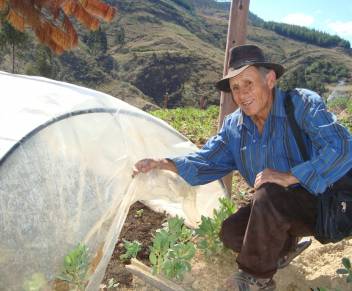 Today is World Food Day, marked by a wealth of discussions on how to improve food systems and tackle hunger and malnutrition in the world.
Today is World Food Day, marked by a wealth of discussions on how to improve food systems and tackle hunger and malnutrition in the world.
Central to this debate is how to make smallholder farmers and food systems in low and middle income countries more resilient to climate extremes and unstable and rising food prices.
In other words: How can we support smallholder farmers to adapt to extreme and unpredictable weather patterns, such as reoccurring droughts and floods and how can we ensure that vulnerable households have secure access to adequate food at all times?
As rural farming populations are ageing – most rapidly and pronounced in South East Asia, but increasingly also in sub-Saharan Africa and Latin America – tackling hunger and malnutrition will increasingly depend on how well policies and programmes to build resilience include and empower older farmers.
Need for better inclusion of older farmers in climate adaptation interventions
However, despite its significance, the reality and implications of rural population ageing for tackling hunger and food insecurity are still largely overlooked in mainstream policy and programming. Older farmers are at best overlooked and at worst discriminated against. Funding and programmes to build farmers’ capacity to adapt to climate change are often targeted at younger farmers only – especially where the adoption of new technologies is required. Older farmers’ are perceived as incapable or unwilling to adopt new practices and therefore are excluded from targeted support.
But is this perception accurate? In our experience: no. In HelpAge’s work with local partners and communities in Sub-Saharan Africa, Latin America, South East Asia and Central Asia we are witnessing how older farmers are capable of adopting new techniques and practices. Additionally, they make huge contributions to developing innovative solutions by drawing on traditional knowledge and their life long experience in adapting to unpredictable and adverse weather patterns.
Empirical studies, too, suggest that older farmers are adopting new agricultural practices equally well as younger farmers. It is thus high time that the adaptive capacities of older farmers, both male and female, are recognised and supported.
Social pensions: securing access to food and promoting investment
Increased population ageing also raises questions regarding appropriate social protection measures. How can we ensure that older people and their dependants will at all times have the means to purchase food and meet their other basic needs – especially when their ability to produce food and generate a cash income declines?
Temporary safety net programmes that require beneficiaries to “graduate” into a state of self-reliance over time are obviously not an appropriate social protection instrument for older people with declining ability to work and often increasing care responsibilities. Rather, non-contributory pensions are best suited to protect older people’s ability to access sufficient and adequate food.
Moreover, even relatively low value pension payments have been found to have positive impacts on older people’s households’ ability to invest in productive activities. Evidence from Sub-Saharan Africa, Latin America and South East Asia shows pensions can improve food security. They do so by protecting assets, such as land, and allowing for investments in farm improvements.
So when talking about about “Sustainable Food Systems for Food Security and Nutrition”, this year’s theme for World Food Day, let us not forget older people’s crucial role in food production and their invaluable agricultural knowledge. In a world where millions are struggling to feed themselves, it would be a huge mistake to overlook older people and their experience.
Read more about our work on livelihoods, social protection and climate change.
